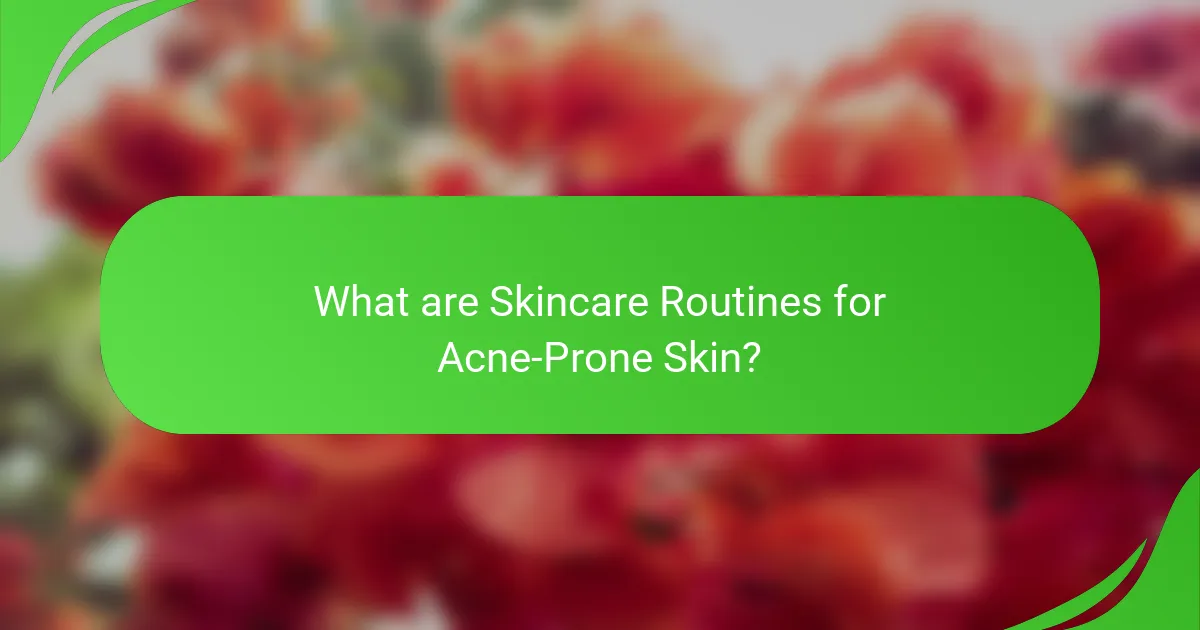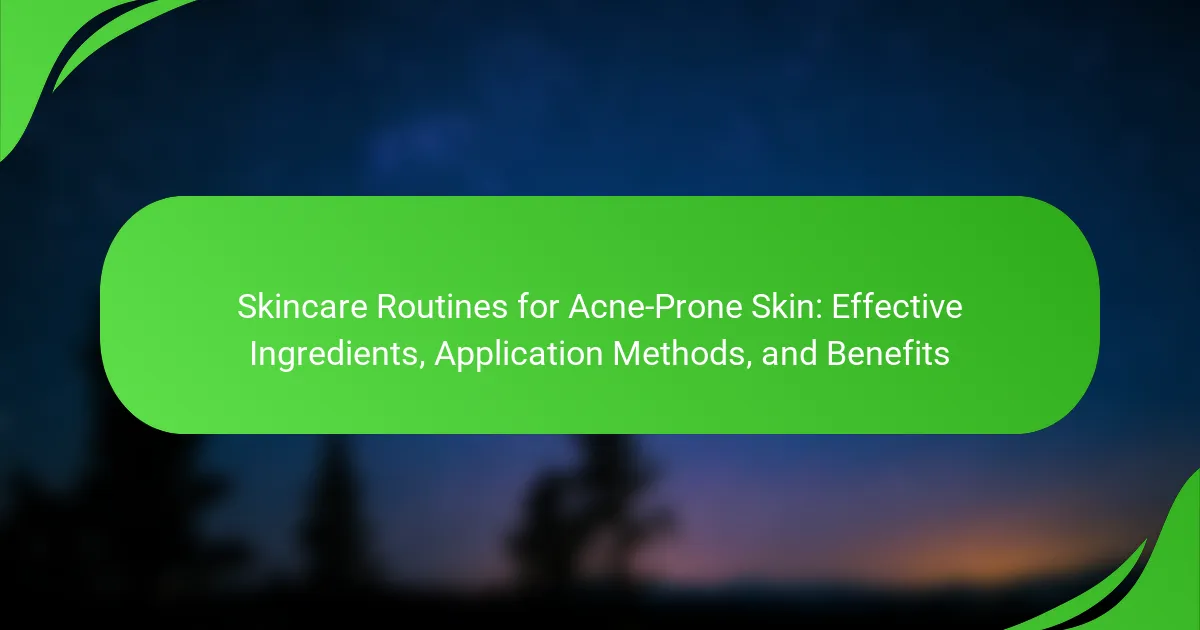Skincare routines for acne-prone skin focus on essential steps including cleansing, exfoliating, treating, moisturizing, and protecting the skin. Key ingredients such as salicylic acid and benzoyl peroxide are effective in targeting acne-causing bacteria and reducing inflammation. Proper application techniques, starting from thinnest to thickest products, enhance absorption and effectiveness. Consistency in this regimen can lead to improved skin health, reduced breakouts, and a more even skin tone, supported by dermatological research emphasizing the importance of daily care.

What are Skincare Routines for Acne-Prone Skin?
Skincare routines for acne-prone skin typically include cleansing, exfoliating, treating, moisturizing, and protecting. A gentle, non-comedogenic cleanser is essential for removing excess oil and impurities. Exfoliation helps to eliminate dead skin cells that can clog pores. Treatments containing ingredients like salicylic acid or benzoyl peroxide target acne-causing bacteria and reduce inflammation.
Moisturizers should be lightweight and oil-free to maintain hydration without exacerbating breakouts. Sunscreen is crucial to protect the skin from UV damage, especially when using active acne treatments. Consistency in this routine can lead to clearer skin over time. Dermatologists recommend following this regimen daily for optimal results.
Why is a Skincare Routine Important for Acne-Prone Skin?
A skincare routine is important for acne-prone skin because it helps manage oil production and prevent breakouts. Consistent cleansing removes excess oil, dirt, and bacteria that contribute to acne. Exfoliation helps unclog pores by removing dead skin cells. Moisturizing balances hydration, which can reduce excess oil production. Targeted treatments with ingredients like salicylic acid or benzoyl peroxide can directly address acne. Studies show that regular skincare routines can lead to fewer breakouts and improved skin appearance. For example, a study published in the Journal of Clinical and Aesthetic Dermatology found that structured skincare regimens significantly reduce acne severity.
What are the common challenges faced by individuals with acne-prone skin?
Individuals with acne-prone skin face several common challenges. These include persistent breakouts that can lead to emotional distress. Many experience difficulty finding suitable skincare products that do not exacerbate their condition. Oily skin is another prevalent issue, which can contribute to clogged pores. Sensitivity to certain ingredients can also complicate treatment options. Additionally, scarring from previous acne can affect self-esteem. Hormonal fluctuations often trigger new breakouts, making management harder. Finally, misinformation about acne treatment can lead to ineffective or harmful practices.
How can a consistent skincare routine help manage acne?
A consistent skincare routine helps manage acne by maintaining skin health and preventing breakouts. Regular cleansing removes excess oil and impurities that can clog pores. Exfoliation promotes cell turnover, reducing the likelihood of acne formation. Moisturizing keeps the skin hydrated, which can balance oil production. Incorporating active ingredients like salicylic acid or benzoyl peroxide targets acne-causing bacteria. Studies show that consistent use of these ingredients can significantly reduce acne lesions. A routine also establishes a sense of control, encouraging adherence to treatments. This commitment can lead to clearer skin over time, as supported by dermatological guidelines.
What are the Key Components of an Effective Skincare Routine?
The key components of an effective skincare routine include cleansing, exfoliating, moisturizing, and sun protection. Cleansing removes dirt and excess oil from the skin. Exfoliating helps to slough off dead skin cells, promoting cell turnover. Moisturizing hydrates the skin, maintaining its barrier function. Sun protection prevents UV damage, which can exacerbate skin conditions. According to the American Academy of Dermatology, these steps are essential for maintaining healthy skin and preventing breakouts. Each component plays a vital role in addressing specific skin concerns, especially for acne-prone skin.
What types of products should be included in a skincare routine for acne-prone skin?
A skincare routine for acne-prone skin should include a cleanser, toner, treatment, moisturizer, and sunscreen. Cleansers should be gentle and non-comedogenic to avoid irritation. Toners can help balance skin pH and remove residual impurities. Treatments often contain active ingredients like salicylic acid or benzoyl peroxide to target acne. Moisturizers should be lightweight and oil-free to hydrate without clogging pores. Sunscreens are essential to protect the skin from UV damage, ideally with a non-comedogenic formula. These products collectively work to manage acne while maintaining skin health.
How do different formulations affect acne-prone skin?
Different formulations can significantly impact acne-prone skin. Gel formulations often provide a lightweight texture that absorbs quickly. They can help reduce excess oil without clogging pores. Creams, on the other hand, may offer hydration but can sometimes exacerbate oiliness. Oil-based formulations can lead to breakouts if not properly balanced. Non-comedogenic products are specifically designed to avoid pore blockage. Ingredients like salicylic acid in formulations target acne by exfoliating and unclogging pores. Research indicates that formulations with benzoyl peroxide are effective in reducing acne-causing bacteria. Each formulation’s specific ingredients and texture play a crucial role in managing acne-prone skin effectively.
What Ingredients are Most Effective for Acne-Prone Skin?
Salicylic acid is one of the most effective ingredients for acne-prone skin. It penetrates pores and helps to exfoliate, reducing acne breakouts. Benzoyl peroxide is another powerful ingredient that kills acne-causing bacteria. It also helps to reduce inflammation and redness associated with acne. Retinoids, such as tretinoin, promote cell turnover and prevent clogged pores. They are effective in treating both acne and post-acne marks. Niacinamide is beneficial for its anti-inflammatory properties and can help reduce redness and improve skin texture. Additionally, tea tree oil has antimicrobial properties that can help reduce acne when used topically. These ingredients are widely supported by dermatological studies for their efficacy in treating acne.
What role do salicylic acid and benzoyl peroxide play in treating acne?
Salicylic acid and benzoyl peroxide are key ingredients in acne treatment. Salicylic acid is a beta hydroxy acid that exfoliates the skin. It penetrates pores to dissolve excess oil and dead skin cells. This helps to prevent clogged pores, a primary cause of acne. Benzoyl peroxide kills acne-causing bacteria on the skin. It reduces inflammation and redness associated with acne lesions. Both ingredients work effectively in combination. Studies show that products containing these ingredients can significantly reduce acne lesions. This makes them popular choices in over-the-counter acne treatments.
How do natural ingredients like tea tree oil and aloe vera benefit acne-prone skin?
Tea tree oil and aloe vera benefit acne-prone skin by providing antibacterial, anti-inflammatory, and soothing properties. Tea tree oil contains terpinen-4-ol, which effectively kills acne-causing bacteria. Studies show that it can reduce acne lesions by 50% within a few weeks. Aloe vera, rich in vitamins and antioxidants, helps to soothe irritation and reduce redness. Its gel-like consistency hydrates the skin without clogging pores. Research indicates that aloe vera can improve overall skin texture and reduce acne scars. Together, these natural ingredients promote clearer skin and enhance healing.

How Should Skincare Products be Applied for Best Results?
Skincare products should be applied in a specific order for best results. Start with a clean face to ensure maximum absorption. Apply products from thinnest to thickest consistency. Begin with a toner or essence, followed by serums, and finish with moisturizers. Use gentle, upward strokes to avoid irritation. Allow each product to absorb fully before applying the next one. This method enhances effectiveness and prevents pilling. Studies indicate that proper application techniques can significantly improve skin texture and hydration levels.
What are the recommended steps in an acne-prone skincare routine?
The recommended steps in an acne-prone skincare routine include cleansing, exfoliating, treating, moisturizing, and applying sunscreen. First, use a gentle cleanser to remove dirt and excess oil. Cleansing twice a day helps prevent clogged pores. Next, exfoliate to remove dead skin cells. This step should be done 1-2 times a week to avoid irritation.
After exfoliation, apply a targeted treatment. Look for ingredients like benzoyl peroxide or salicylic acid. These ingredients help reduce acne and prevent future breakouts. Following treatment, use a lightweight, non-comedogenic moisturizer. Moisturizing is crucial to maintain skin hydration without clogging pores.
Finally, apply a broad-spectrum sunscreen during the day. Sunscreen protects the skin from UV damage, which can worsen acne. Consistently following these steps can lead to clearer skin over time.
How should products be layered for maximum effectiveness?
Products should be layered from thinnest to thickest for maximum effectiveness. Start with a cleanser to remove impurities. Follow with a toner to balance skin pH. Next, apply serums containing active ingredients like salicylic acid or niacinamide. After serums, use a moisturizer to hydrate the skin. Finally, finish with sunscreen during the day to protect against UV damage. This order ensures optimal absorption and efficacy of each product. Studies show that layering products correctly enhances their effectiveness and minimizes irritation, particularly for acne-prone skin.
What techniques can enhance product absorption?
Techniques that can enhance product absorption include applying products on slightly damp skin and using gentle massage. Applying products on damp skin can increase permeability, allowing for better absorption. Gentle massage stimulates blood circulation, which aids in product [censured]. Additionally, layering products from thinnest to thickest consistency helps to maximize absorption. Using occlusive agents, like oils or creams, can also lock in moisture and improve absorption. Studies show that these methods can significantly enhance the efficacy of skincare products, especially for acne-prone skin.
What Common Mistakes Should be Avoided in Skincare Routines?
Common mistakes to avoid in skincare routines include over-exfoliating, using harsh products, and skipping sunscreen. Over-exfoliating can lead to skin irritation and increased oil production. Harsh products may strip the skin of its natural oils, causing dryness and irritation. Skipping sunscreen exposes the skin to harmful UV rays, increasing the risk of skin damage. Additionally, not tailoring products to skin type can result in ineffective treatment. Inconsistent application of products can hinder progress in achieving clear skin. Lastly, neglecting to patch-test new products may lead to adverse reactions.
How can over-exfoliation negatively impact acne-prone skin?
Over-exfoliation can lead to irritation and increased acne in acne-prone skin. This occurs because excessive exfoliation disrupts the skin barrier. A compromised skin barrier can cause inflammation. Inflammation can worsen existing acne and lead to new breakouts. Studies show that over-exfoliation increases skin sensitivity. Increased sensitivity can make acne-prone skin more reactive to products. Furthermore, over-exfoliation may result in dryness. Dry skin can trigger more oil production, leading to clogged pores.
What should be considered when switching products in a skincare routine?
When switching products in a skincare routine, consider skin type, ingredient compatibility, and potential reactions. Skin type determines what products are suitable. For example, oily skin benefits from non-comedogenic ingredients. Ingredient compatibility ensures that active ingredients do not counteract each other. For instance, combining retinol with certain acids can cause irritation. Monitor for adverse reactions when introducing new products. Gradual introduction helps identify any negative effects. Patch testing is recommended before full application. Lastly, evaluate product efficacy over time, as results may take weeks to manifest.

What Benefits Can be Expected from a Proper Skincare Routine?
A proper skincare routine can lead to improved skin health and appearance. Regular cleansing removes dirt and excess oil. This helps to prevent acne breakouts. Exfoliation promotes cell turnover, revealing fresher skin. Moisturizing maintains hydration and supports the skin barrier. Targeted treatments can address specific concerns, such as acne or hyperpigmentation. Consistency in a routine enhances overall skin texture and tone. Studies show that individuals with a regular skincare regimen report fewer skin issues. This is supported by dermatological research emphasizing the importance of daily care.
How does a tailored skincare routine improve skin health?
A tailored skincare routine improves skin health by addressing individual skin needs. It allows for the selection of products that target specific concerns like acne, dryness, or aging. Personalized routines can enhance hydration, reduce inflammation, and promote skin barrier function. Research indicates that customized regimens lead to better adherence and results. According to a study published in the Journal of Dermatological Treatment, personalized skincare significantly improves patient satisfaction and overall skin condition. Tailored routines ensure that the right ingredients are used in appropriate concentrations for maximum efficacy. This customized approach minimizes adverse reactions and enhances the overall appearance of the skin.
What long-term effects can a consistent routine have on acne-prone skin?
A consistent skincare routine can significantly improve acne-prone skin over the long term. Regular use of suitable products helps to regulate oil production. This can reduce the occurrence of breakouts. Consistency can also enhance skin texture and tone. It promotes faster healing of existing acne lesions. A well-maintained routine minimizes the risk of scarring. Studies show that adherence to a regimen can lead to clearer skin. For example, a study published in the Journal of Dermatological Treatment found that consistent use of topical retinoids improved acne severity over time.
What Additional Tips Can Help Manage Acne-Prone Skin?
To manage acne-prone skin, maintain a consistent skincare routine. Cleanse your face twice daily with a gentle cleanser. Exfoliate regularly to remove dead skin cells, but avoid harsh scrubs. Use non-comedogenic moisturizers to keep skin hydrated without clogging pores. Incorporate products with salicylic acid or benzoyl peroxide to target acne. Avoid touching your face to reduce bacteria transfer. Protect your skin from sun exposure with a suitable sunscreen. Lastly, consider consulting a dermatologist for personalized treatment options. These practices help reduce breakouts and improve skin health.
How can lifestyle choices impact the effectiveness of a skincare routine?
Lifestyle choices significantly impact the effectiveness of a skincare routine. Factors such as diet, hydration, sleep, and stress levels directly influence skin health. A balanced diet rich in antioxidants can enhance skin appearance and function. Hydration helps maintain skin elasticity and moisture levels. Insufficient sleep can lead to increased inflammation and skin issues. High-stress levels may trigger acne and other skin conditions. Studies indicate that a healthy lifestyle supports better skin outcomes. For instance, a 2019 study published in the Journal of Dermatological Science found that nutrition affects skin barrier function and overall skin health. Therefore, adopting positive lifestyle choices can optimize skincare results.
What are some practical tips for maintaining a skincare routine on a budget?
To maintain a skincare routine on a budget, prioritize essential products. Focus on a gentle cleanser, moisturizer, and sunscreen. Look for affordable brands that offer quality ingredients. Consider multi-use products to save money and space. Buy in bulk or during sales to reduce costs. DIY treatments using natural ingredients can be effective and budget-friendly. Research product reviews to ensure effectiveness before purchasing. Keep your routine simple to avoid unnecessary expenses.
Skincare routines for acne-prone skin focus on effective cleansing, exfoliating, treating, moisturizing, and protecting to manage breakouts and improve skin health. Key ingredients such as salicylic acid and benzoyl peroxide play vital roles in targeting acne-causing bacteria and reducing inflammation. The article outlines the importance of consistency in skincare, common challenges faced by individuals with acne, and the recommended steps for an effective routine. Additionally, it discusses the impact of product formulations and application techniques, as well as lifestyle choices on skincare effectiveness, providing practical tips for maintaining a routine on a budget.


